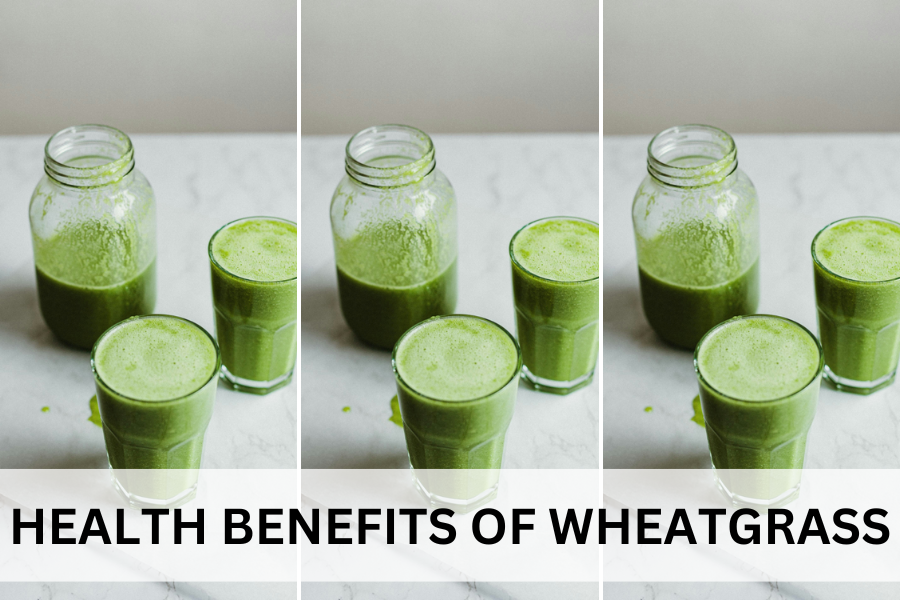Incorporating wheatgrass into your daily routine is a simple step you can take towards improving your health. Wheatgrass is a superfood that will be incredibly beneficial for you on your journey to good health. As someone who drinks wheatgrass daily and has experienced some of these amazing health benefits myself, I am giving you the low-down on the health benefits of wheatgrass.

This post is all about the health benefits of wheatgrass.
Wheatgrass is a nutrient-dense food, brimming with essential vitamins and minerals. It’s rich in vitamins A, C, and E, K, and B vitamins and is a source of potassium, dietary fiber, thiamin, riboflavin, niacin, pantothenic acid, iron, zinc, copper, manganese, magnesium, and selenium.
It also contains up to 8 grams of protein per ounce (if consumed in powder form), which makes it a good source of protein. This protein content has been shown to consist of at least 17 forms of amino acids, including eight out of nine essential amino acids.
Antioxidant Benefits
Wheatgrass has a high antioxidant content. Studies show that a diet high in antioxidants may reduce the risk of many diseases, including heart disease, by combating free radicals (unstable molecules that can cause cellular damage and lead to chronic diseases) from bodily cells and preventing or reducing the damage caused by oxidation. A study conducted in 2018 noted that the proteins and antioxidant agents in wheatgrass might help prevent diseases, reduce oxidative stress and boost the metabolism and storage of energy. By drinking wheatgrass regularly, you can help reduce oxidative stress and inflammation in your body due to this.
Detoxification Support
Wheatgrass is believed to cleanse the liver and promote the elimination of toxins from the body. This detoxification process can lead to improved digestion by reducing bloating, gas and stomach issues, as well as better skin health, and enhanced overall well-being.
Menstrual Pain Relief
Due to its anti-inflammatory properties and high nutrient content, wheatgrass can aid in the menstrual cycle. It may help provide some relief the symptoms of menstrual pain and/or discomfort such as bloating.
High Fiber Content
Wheatgrass is high in fiber, making it beneficial for gut health, and has been shown to help control blood sugar and cholesterol levels. Fiber also helps you to feel fuller for longer after eating, which may also aid in weight loss.
Immune System Boost
Regular consumption of wheatgrass can help to support and strengthen your immune system. With its rich array of vitamins and minerals, it can help your body fend off infections and illnesses which can be especially beneficial during cold and flu season!
Increased Energy Levels
Many people who drink wheatgrass report having a noticeable boost in energy when they add it into their daily routine. The nutrients in wheatgrass can enhance your body’s overall vitality and help you to feel more energized throughout the day.
Alkalizing Effect
Wheatgrass is one of the most alkaline foods you can get your hands on. It has an alkalizing effect on the body, which can help in balancing your body’s pH levels. Maintaining an optimal pH is important for overall health, as an overly acidic environment can lead to various health issues.
Some More Health Benefits Of Wheatgrass
– Blood sugar regulation
– Inflammation
– Reducing cholesterol levels
– Possible weight loss aid
– A test-tube study showed that wheatgrass extract decreased the spread of mouth cancer cells by 41% (link here)
– A test-tube study showed that wheatgrass induced cell death and reduced the number of leukemia cells by up to 65% within three days of treatment (link here)
[However, there is no evidence on the potential anti-cancer effects of wheatgrass in humans. More studies need to be done to understand how it may impact cancer development in humans.]
How to Incorporate Wheatgrass into Your Daily Routine
Incorporating wheatgrass into your daily diet is simple. Here are a few ways to do so:
— Wheatgrass Juice: Freshly pressed wheatgrass juice is the most potent way to consume it. Some health food stores offer fresh shots of wheatgrass.
– Powdered: Add a tablespoon of wheatgrass powder to a glass of water or your morning smoothie.
– Supplements: Wheatgrass powder capsules or tablets are available as a convenient alternative
Cautions
It is recommended that pregnant or breastfeeding women should not take wheatgrass. Also, if you have a gluten intolerance you should check with your doctor before taking it.
This post was all about the health benefits of wheatgrass to help you understand how wheatgrass can greatly benefit your health when it is part of your daily routine.
Other Posts You’ll Love